World events of 2014 in photos (Part 1)
A glimpse of the world’s biggest events during the first half of 2014.
JANUARY
Jan. 1
— The Palestinian ambassador to the Czech Republic dies in an explosion that occurred when he opened an old safe that had been left untouched for more than 20 years.
Jan. 2
— An explosion tears through a crowded commercial street in a south Beirut neighborhood that is a bastion of support for the Shiite group Hezbollah, killing at least five.
Jan. 3
— Secretary of State John Kerry’s closed-door diplomacy to broker peace between Israel and the Palestinians bursts into a public spat with both sides trading bitter criticisms.
Jan. 4
— The city center of Iraq’s Fallujah falls completely into the hands of fighters from the al-Qaida-linked Islamic State of Iraq and the Levant.

Mourners and Sunni gunmen chant slogans against Iraq’s Shiite-led government during the funeral of a man killed when clashes erupted between al-Qaeda gunmen and Iraqi army soldiers on Friday, his family said, in Fallujah, 40 miles (65 kilometers) west of Baghdad, Iraq, Saturday, Jan. 4, 2014. AP
Jan. 5
— Secretary of State John Kerry says the U.S. will support Iraq’s fight against al-Qaida-linked militants who have overrun two cities but will not send in U.S. troops.
Jan. 6
– Millions of Egyptian Christians throng churches across the mainly Muslim nation for Christmas Mass amid unusually tight security in response to fears Islamic militants loyal to ousted President Mohammed Morsi might attack.
Jan. 7
— The first batch of the most dangerous chemicals in Syria’s arsenal is loaded on a Danish ship and taken out of the country, an important milestone in an international operation to rid President Bashar Assad of the weapons.
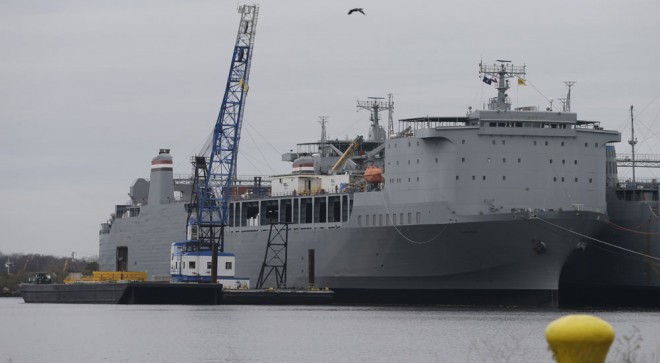
A barge is anchored alongside the MV Cape Ray in Portsmouth, Va., Thursday, Jan. 2, 2014. The ship houses two of the systems that are capable of neutralizing lethal chemical weapons such as nerve gas with water and bleaching compounds. AP
Jan. 8
— President Nicolas Maduro hastily gathers state governors and mayors to talk about the country’s violent crime amid public outrage of the killing of a popular soap opera actress and former Miss Venezuela.
Jan. 9
— A senior police investigator known for hunting down Pakistani Taliban militants is killed in a car bombing in Karachi, a blow to security in the country’s biggest city.
Jan. 10
— The U.S. advises Americans planning to attend the Winter Olympics in Sochi, Russia, to be vigilant about their security due to potential terrorist threats.
Jan. 11
— Sub-Saharan Africa sees a violent start to 2014 with raging conflicts in South Sudan and the Central African Republic as well as continued violence in Congo and attacks in Kenya and Somalia.
Jan. 12
— Iran agrees to open the Islamic Republic’s nuclear program to daily inspection starting Jan.20, setting the clock running on a six-month deadline for a final agreement.
Jan. 13
— A new law in Nigeria, signed by the president without announcement, makes it illegal for gays to even hold a meeting. The Same Sex Marriage Prohibition Act also criminalizes homosexual organizations and clubs.
Jan. 14
— French President Francois Hollande concedes that he is going through “painful moments” with his companion who was hospitalized after a magazine reported he was secretly having an affair with a movie actress.
Jan. 15
— The future king of Bahrain meets with top Shiite opposition leaders for the first time in nearly three years.
Jan. 16
—The Vatican is called to account before an obscure U.N. human rights committee after decades of fending off accusations its culture of secrecy had contributed to the global priest sex abuse scandal.
Jan. 17
— A suicide bomber blows himself up outside a Kabul restaurant filled with foreigners and affluent Afghans while two gunmen sneak in through a back door and open fire in a brazen dinnertime attack that kills 21.
Jan. 18
— The main Western-backed Syrian opposition group votes in favor of attending a coming peace conference aimed at ending the country’s bloody civil war.
Jan. 19
— An Islamic militant group in Russia’s North Caucasus claims responsibility for the recent twin bombings in the southern city of Volgograd and posts a video threatening a strike at the 2014 Winter Olympics in Sochi.
Jan. 20
— Iran unplugs banks of centrifuges involved in its most sensitive nuclear enrichment program, prompting the U.S. and the European Union to partially lift economic sanctions as a landmark deal aimed at easing concerns over Iran’s nuclear program goes into effect.
Jan. 21
—Thousands of Egyptians urge the country’s powerful army chief, Abdel-Fattah el-Sissi, to run for president at a rally, angering pro-democracy advocates.
Jan. 22
— Representatives of Syrian President Bashar Assad and the rebellion against him threaten to collapse a peace conference in Switzerland intended to lead them out of civil war.
Jan. 23
— South Sudan’s government and rebels sign a cease-fire that leaders hope will end five weeks of warfare that has killed thousands of soldiers and civilians.
Jan. 24
— A truck bombing strikes the main security headquarters in Cairo, one of a string of bombings targeting police in a 10-hour period, killing 6 on the eve of the third anniversary of the revolt that overthrew President Hosni Mubarak and left the Arab nation deeply divided.
Jan. 25
— Syria’s government and opposition face each other for the first time in Switzerland, buffered by a U.N. mediator hoping to guide them to a resolution of the country’s devastating civil war.
Jan. 26
— Thousands of Ukrainians chant “hero” and sing the national anthem as the coffin of a protester who was killed in clashes with police is carried through the streets of Kiev, underscoring the rising tensions in the country’s two-month political crisis.

Protesters clash with riot police in central Kiev, Ukraine, Sunday, Jan. 19, 2014. Hundreds of protesters on Sunday clashed with riot police in the center of the Ukrainian capital, after the passage of harsh anti-protest legislation last week seen as part of attempts to quash anti-government demonstrations. AP
Jan. 27
— Suspected Islamic extremists used explosives and heavy guns to attack a village and worshippers during a Christian service in northern Nigeria, killing at least 99 and razing hundreds of homes.
Jan. 28
— Ukraine’s prime minister resigns and parliament repeals anti-protest laws in back-to-back moves designed to defuse the country’s political crisis.
Jan. 29
—Syrian President Bashar Assad’s adviser rejects the opposition’s call for a transitional government body and suggests for the first time that a presidential election scheduled to be held later this year may not take place amid raging violence.
Jan. 30
— An appeals court in Florence upholds the guilty verdict against U.S. student Amanda Knox and her ex-boyfriend for the 2007 murder of her British roommate, raising the prospect of a long legal battle over her extradition from Italy to serve a 28 1/2 year prison sentence if the conviction stands.
Jan. 31
— The long-delayed Keystone XL oil pipeline clears a major hurdle toward approval, a serious blow to environmentalists’ hopes that President Barrack Obama will block the controversial project running more than 1,000 miles (1,600 kilometers) from Canada through the heart of the U.S.
FEBRUARY
Feb. 1
— Gunfire rings out across a busy intersection in Thailand’s capital for more than an hour as government supporters clash with protesters trying to derail tense nationwide elections one day before vote begins.

Thai anti-government protesters march during a rally on a street outside the prime minister’s office of government house in Bangkok, Thailand Monday, Feb. 17, 2014. Thailand’s economy grew 0.6 percent in the final three months of 2013 compared with the same quarter a year earlier, data showed Monday, as political turmoil hit consumer confidence and tourism. AP
Feb. 2
— Syria unleashes a wave of airstrikes on more than a dozen opposition-held neighborhoods in the northern city of Aleppo in a ferocious attack that kills at least 36 people.
Feb. 3
— Al-Qaida’s central leadership breaks with one of its more militant branch commanders in an apparent attempt to stem deadly fighting that has erupted in Syria among militant factions trying to bring down President Bashar Assad.
Feb. 4
— Facebook, which has transformed how much of the world communicates, marks its 10th anniversary.
Feb. 5
—The Vatican “systemically” adopted policies that allowed priests to rape and molest tens of thousands of children over decades, a U.N. human rights committee says, urging the Holy See to open the files on pedophiles and the bishops who concealed their crimes.
Feb. 6
— A suicide bomber blows himself up at the gates of a Syrian prison and rebels storm in behind him, freeing hundreds of inmates as part of an offensive aimed at capturing key government symbols around the northern city of Aleppo.
Feb. 7
— Thousands of Muslims climb aboard trucks protected by heavily armed Chadian soldiers in a mass exodus from the capital of the Central African Republic, the scene of daily violence that has left untold numbers dead.
Feb. 8
— The U.N. says the number of children killed and wounded in Afghanistan jumped by 34 percent last year as the Taliban stepped up attacks across the country.
Feb. 9
— Hundreds of civilians are evacuated from the besieged Syrian city of Homs, braving gunmen spraying bullets and lobbing mortars to flee as part of a three-day truce to relieve a choking blockade.
Feb. 10
— An instructor teaching his militant recruits how to make car bombs accidentally sets off explosives in his demonstration, killing 21 of them in a blast that alerts Iraqi authorities to the existence of a training camp north of Baghdad.
Feb. 11
— President Barack Obama says the peace talks to end Syria’s civil war are far from achieving their goal of halting violence and facilitating a political transition.
Feb. 12
— Syrian war planes pound a rebel-held town near the Lebanese border as opposition leaders in Geneva call on Russia to put pressure on the government to prevent the faltering peace negotiations from collapsing.
Feb. 13
— Italy’s Premier Enrico Letta resigns after losing essential support for his battered 10-month coalition government, clearing way for rise of his center-left rival Matteo Renzi.
Feb. 14
— Uganda President Yoweri Museveni plans to sign a bill that mandates life in prison for some homosexual acts, alarming activists who have condemned the bill as draconian in a country where homosexuality has already been criminalized.
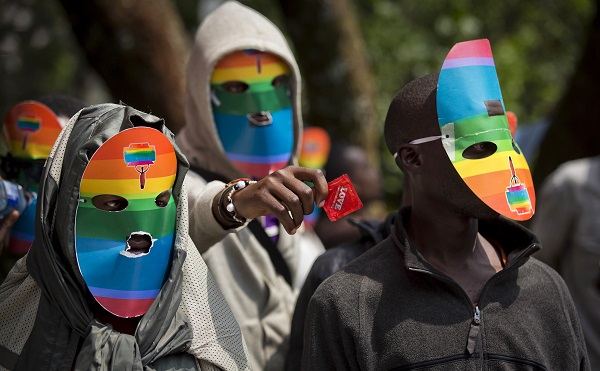
In this Monday, Feb. 10, 2014 file photo, Kenyan gays and lesbians and others supporting their cause wear masks to preserve their anonymity and one holds out a condom, as they stage a rare protest, against Uganda’s increasingly tough stance against homosexuality and in solidarity with their counterparts there, outside the Uganda High Commission in Nairobi, Kenya. Uganda’s President Yoweri Museveni is expected to sign Monday, Feb. 24, 2014 a controversial anti-gay bill that allows harsh penalties for homosexual offenses, a bill which rights groups have condemned as draconian in a country where homosexuality is already illegal. AP
Feb. 15
— Lebanon’s prime minister forms a cabinet more than 10 months after taking office, including a wide range of political groups after bridging serious divisions, mostly over Syria’s civil war.
Feb. 16
— U.S. Secretary of State John Kerry calls climate change perhaps the ‘most fearsome’ destructive weapon and mocks those who deny its existence or questions it causes, comparing them to people who insist the earth is flat.
Feb. 17
— A U.N. panel warns North Korean leader Kim Jong Un he may be held accountable for orchestrating widespread crimes against civilians in the secretive Asia nation, ranging from systematic executions to torture, rape and mass starvation.
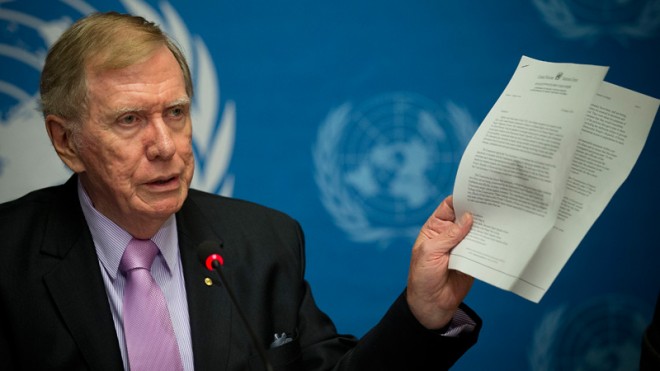
Retired Australian judge Michael Kirby, chairperson of the commission of Inquiry on Human Rights in the Democratic People’s Republic of Korea, shows a UN letter to North Korean leader warning on-accountability for crimes during a press conference at the United Nations in Geneva, Switzerland, Monday, Feb. 17, 2014. A U.N. panel has warned North Korean leader Kim Jong Un that he may be held accountable for orchestrating widespread crimes against civilians in the secretive Asian nation. AP
Feb. 18
— Iran draws a red line on how far it will go at landmark nuclear talks, saying as a meeting opens it will not buckle to pressure from the U.S. and five other world powers to scrap any of its nuclear facilities.
Feb. 19
— A senior Taliban official says Washington has held indirect talks over the possible transfer of five senior Taliban prisoners from the Guantanamo Bay prison in exchange for a U.S. soldier captured nearly five years ago.
Feb. 20
— Protesters advance on police lines in the heart of the Ukrainian capital of Kiev, prompting government snipers to shoot and kill scores of people.
Feb. 21
— Matteo Renzi forms a coalition government in Italy; at 39 he will be the country’s youngest premier ever.
Feb. 22
— Ukraine’s former prime minister Yulia Tymoshenko leaves prison and speaks to an ecstatic crowd in Kiev as her arch foe President Viktor Yanukovych decamps to the country’s east and vows to remain in power even though protesters control the capital and parliament votes to remove him.
Feb. 23
— Joaquin “El Chapo” Guzman, head of a powerful multinational drug organization, is back in Mexican custody after 13 years on the run, narrowly escapes from the military, law enforcement and rivals.

In this Saturday, Feb. 22, 2014 photo, Joaquin “El Chapo” Guzman is escorted to a helicopter in handcuffs by Mexican navy marines at a navy hanger in Mexico City, Mexico. Guzman, the head of Mexico’s Sinaloa Cartel, was captured overnight in the beach resort town of Mazatlan. AP
Feb. 24
— Ukraine’s interim government draws up a warrant for fugitive President Viktor Yanukovych’s arrest in the killing of anti-government protesters last week while Russia issues its strongest condemnation yet of the new leaders in Kiev, saying they came to power as a result of “armed mutiny.”
Feb. 25
— The founder of Latin American-inspired theology advocating for the poor receives a hero’s welcome at the Vatican as the once-criticized movement continues its rehabilitation under Pope Francis.
Feb. 26
— The top U.S. military officer says Afghanistan’s refusal to sign a security agreement with the U.S. may make the fight more difficult this year, embolden the enemy and prompt some Afghan security forces to cooperate with the Taliban to “hedge their bets.”
Feb. 27
— Masked gunmen storm parliament in Ukraine’s strategic Crimean region while the newly formed interim government pledges to prevent a breakup with strong backing for the West.
Feb. 28
— Armed men take control of key airports in Crimea and Russian transport planes fly into the strategic region, an ominous sign of Kremlin’s iron hand in Ukraine.
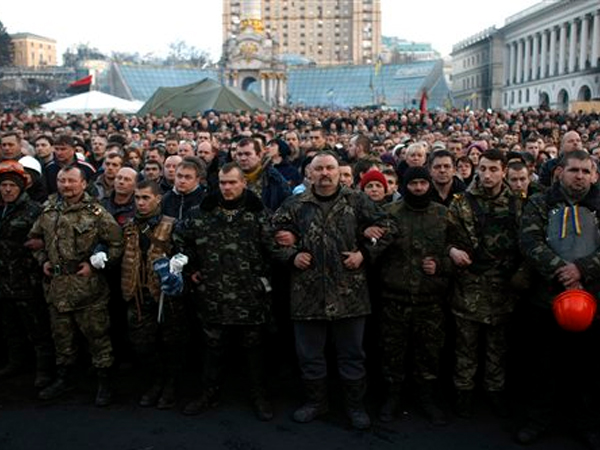
People gather at Independence Square during a funeral procession for anti-government protesters killed in clashes with the police in Kiev, Ukraine, February 28, 2014. AP
MARCH
March 1
— Russian troops take over Ukraine’s Crimea.
March 2
— The United States and other Western nations vow a tough response to Russia’s military advance in Ukraine and warn Moscow of economic penalties, diplomatic isolation and bolstered allied defenses in Europe.
March 3
— Russia calls for a national unity government in Ukraine as it tightens its stranglehold on Crimea in a bold combination of diplomacy and escalating military pressure.
March 4
— A defiant President Vladimir Putin dismisses threats of U.S. and European Union economic sanctions, alleges that “rampaging neo-Nazis” dominate Ukraine’s capital and says Russian and Ukrainian soldiers locked in a standoff in Crimea are “brothers in arms.”
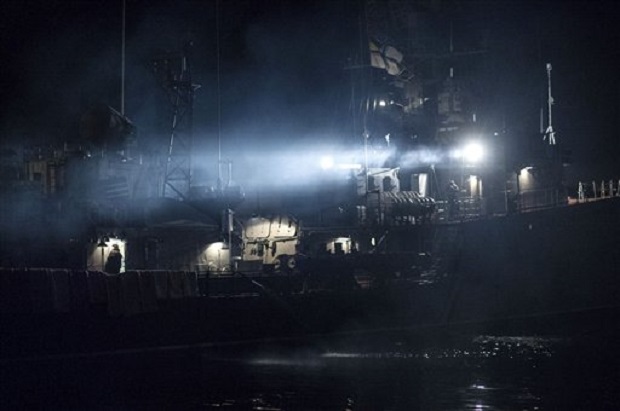
Ukrainian navy corvette Ternopil is anchored at Ukrainian navy base in Sevastopol, Ukraine, early Tuesday, March 4, 2014. Russian troops said to be 16,000 strong tightened their stranglehold on Ukraine’s Crimean Peninsula Monday, openly defying the U.S. and the European Union and rattling world capitals and stock markets. AP
March 5
— Israeli naval forces seize a ship laden with rockets allegedly bound for militants in the Gaza Strip and officials accuse Iran of orchestrating the 5,000-mile (8,000 kilometer) journey.
March 6
—Ukraine lurches toward breakup as lawmakers unanimously declare they want to join Russia and plan to put the decision to voters. President Barack Obama condemns the move and the West imposes the first real sanctions against Russia.
March 7
— Russia is swept up in a patriotic fervor for annexing Crimea with tens of thousands of people thronging Red Square and chanting “Crimea is Russia.”
March 8
— A Malaysia Airlines Boeing 777 with 239 people on board vanishes on a flight from Kuala Lumpur to Beijing, setting off a massive search for its whereabouts.
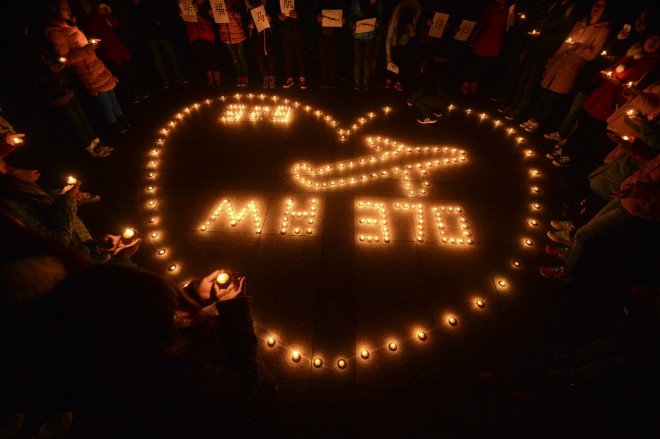
In this Thursday March 13, 2014 photo, university students hold a candlelight vigil for passengers on the missing Malaysia Airlines Flight MH370 in Yangzhou, in eastern China’s Jiangsu province. China on Friday urged Malaysia’s government to release any information it has regarding the missing Malaysia Airlines jetliner to help narrow the search area. AP
March 9
— Testimony in the first week of Oscar Pistorious’ murder trial is riveting and more evidence is expected as prosecutors seek to prove beyond reasonable doubt that the double-amputee athlete intentionally shot dead his girlfriend.
March 10
— Syrian rebels release a group of Greek Orthodox nuns in exchange for dozens of women held in government prisons — a rare deal between Damascus and al-Qaida-linked rebels, mediated by Qatari and Lebanese officials.
March 11
— A Swedish reporter is shot dead in Afghanistan while reporting in an affluent and well-guarded area of Kabul, highlighting fears of rising violence ahead of crucial presidential elections.
March 12
— President Barack Obama says the United States will “completely reject” a referendum in Crimea opening the door for the Ukrainian peninsula to join Russia, with Ukraine’s interim prime minister, Arseniy Yatsenyuk, at his side.
March 13
— Survivors says dozens of gunmen on motorbikes have killed more than 100 villagers in a conflict over land in northern Nigeria.
March 14
— Paris could deliver France’s first-ever genocide conviction, sentencing a former Rwanda intelligence chief to 25 years in prison over the 1994 killings of at least 500,000 people in the African country.
March 15
— Malaysia’s prime minister says a Malaysian jetliner missing for more than a week had deliberately diverted and continued flying for more than seven hours after severing contact with the ground, meaning it could have gone as far northwest as Kazakhstan or into the Indian Ocean’s southern reaches.
March 16
— Crimeans vote to leave Ukraine and join Russia, overwhelmingly approving a referendum that sought to unite the strategically important Black Sea region with the country it was part of for some 250 years.
March 17
— Russian President Vladimir Putin recognizes Ukraine’s Crimean Peninsula as an “independent and sovereign country,” ignoring sanctions imposed by the United States and European countries and creating the most profound rift in East-West relations since the end of the Cold War.
March 18
— President Vladimir Putin redraws Russia’s borders by reclaiming Crimea, provoking denunciations from the Western leaders who call Putin a threat to the world.

President Vladimir Putin answers journalists’ questions on current situation in Ukraine at the Novo-Ogaryovo presidential residence outside Moscow on Tuesday, March 4, 2014. AP
March 19
— Ukraine announces plans for massive troop withdrawals from Crimea, surrendering to Russia’s inexorable seizure of the strategic peninsula.
March 20
— President Barack Obama orders economic sanctions against nearly two dozen members of Russian President Vladimir Putin’s inner circle and a major bank that provides them support, raising the stakes in an East-West showdown over Ukraine.
March 21
— The Taliban kill nine people in a luxury hotel in Kabul that had tight security, boasting two weeks before national elections they can strike anywhere in Afghanistan.
March 22
— Pope Francis names initial members of commission to advise him on sex abuse policy, signaling an openness to reach beyond Roman Catholic church officials to plot the commission’s course and priorities: half of the members are women.
March 23
— Malaysian Prime Minister Najib Razak confirms than a Boeing 777 airliner with 239 people aboard that has been missing for 16 days plunged into a remote corner of the Indian Ocean.
March 24
— Ukraine’s fledgling government orders troops to pull back from Crimea, ending days of wavering as Russian forces storm and seize bases on the peninsula.
March 25
— President Barack Obama declares that a security summit took “concrete steps” to prevent nuclear material falling into the hands of terrorists, though Russia and China fail to sign agreement to beef up inspections.
March 26
— Abdel-Fattah al-Sissi, the Egyptian military chief who removed the elected Islamist president, announces he has resigned from the army and will run for president.
March 27
— The world rushes to help Ukraine, with the International Monetary Fund pledging up to $18 billion in loans, the U.N. condemning the vote that drove Crimea into Russian hands and the U.S. Congress backing even harsher sanctions against Moscow.
March 28
— Russian President Vladimir Putin calls President Barack Obama to discuss a solution to the crisis in Ukraine; they agree top U.S. and Russian diplomats should work on the details.
March 29
—A U.N. panel of scientists reports on how climate change is affecting humans and the planet and how the future will be worse unless something is done about it.
March 30
— A decisive victory in local elections gives Turkish Prime Minister Recep Tayyip Erdogan momentum that could see him start a campaign to become the country’s first directly elected president; ruling Socalists take a drubbing in France’s voting.
March 31
— The United States talks to Israel about releasing convicted spy Jonathan Pollard from his life sentence as an incentive to Israelis in the troubled Mideast peace negotiations.
APRIL
April 1
— NATO foreign ministers move to strengthen defenses of front-line members feeling menaced by a more assertive Russia, with Secretary of State John Kerry proclaiming U.S. commitment to their security is “unwavering.”
April 2
— A decision by President Mahmoud Abbas to seek further international recognition of the “state of Palestine” — despite promises to hold off while negotiating with Israel — throws into disarray the troubled U.S. mediation of a peace deal.
April 3
— The U.S. government masterminded the creation of a “Cuban Twitter” network designed to undermine the communist government in Cuba, The AP reports.
April 4
— An Afghan police officer opens fire on two Associated Press journalists inside a security forces base in eastern Afghanistan, killing prize-winning photographer Anja Niedringhaus and wounding veteran correspondent Kathy Gannon.
April 5
— Millions of Afghans defy Taliban threat and rain, underscoring their enormous expectations from an election to choose President Hamid Karzai’s successor as the country’s wobbly government prepares to face down a ferocious insurgency largely on its own.
April 6
— Searchers hunting for a missing Malaysian Airlines jet race toward a patch of the southern Indian Ocean to determine whether a few, brief sounds picked up by underwater equipment came from the plane’s black boxes, whose battery-powered pingers are nearly dead.
April 7
— Pro-Russian activists barricaded inside government buildings in eastern Ukraine proclaim their regions independent and call for a referendum on seceding from Ukraine, an ominous echo of events that led to Russia’s annexation of Crimea.
April 8
— U.S. says it will keep its current force of 450 land-based nuclear missiles but remove 50 from their launch silos as part of a plan to bring U.S. into compliance with a 2011 US-Russia arms control treaty.
April 9
— Russian President Vladimir Putin turns up the heat on Ukraine by threatening to demand advance payment for gas supplies in a move designed to exert economic pressure on Ukraine as it confronts a mutiny by pro-Russian separatists in the east.
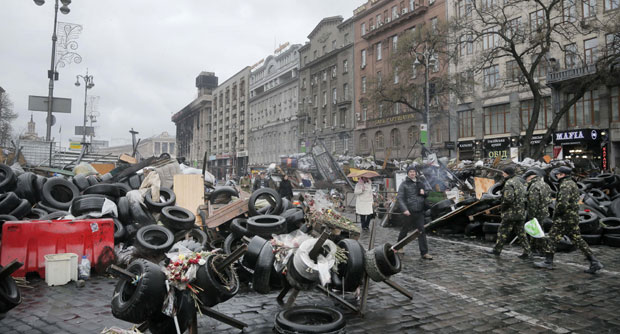
People pass by barricades near the Dnipro Hotel in Kiev, Ukraine, Tuesday, April 1, 2014. A tense standoff between Ukrainian police and a radical nationalist group Right Sector ended Tuesday, when its members surrendered their weapons and left a downtown hotel. Their departure followed a shooting spree in the capital, in which a Right Sector member shot and wounded three people outside a restaurant adjacent to the capital’s main Independence Square, including a deputy mayor of the capital. AP
April 10
— Buoyant Greek officials hail the country’s return to the international bond market as an overwhelming success story since it nearly went bankrupt in 2010.
April 11
— The U.S. blocks Iran’s controversial pick as envoy to the United Nations in a rare diplomatic rebuke that could stir fresh animosity at a time when Washington and Tehran have been seeking a thaw in relations.
April 12
— Partial results from the Afghanistan presidential election have candidates Abdullah Abdullah and Ashraf Ghani heading for a runoff.
April 13
— Ukraine says it is sending troops into the country’s industrial east to try to quash an increasingly brazen pro-Russian insurgency despite repeated warnings from the Kremlin.
April 14
— Suspected Islamic militants strike in the heart of Nigeria with a massive rush-hour bomb blast that kills at least 72 in the deadliest attack ever in Abuja, the capital.
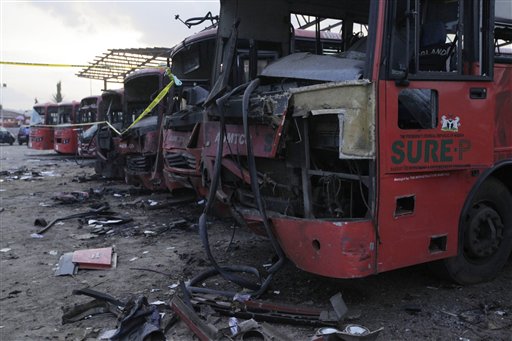
Damaged buses are seen at the scene of an explosion at a bus park in Abuja, Nigeria, Monday, April. 14, 2014. Suspected Islamic militants struck at the heart of Nigeria with a massive rush-hour explosion at a bus station Monday that killed 71, with the toll expected to rise in the deadliest attack yet on the nation’s capital. AP
April 15
— The Ukrainian military repels an attack by 30 gunmen at an airport in the east in their first operation against a pro-Russian uprising.
April 16
— Students among hundreds missing as South Korean ferry sinks.

Rescue helicopters fly over a sinking South Korean passenger ferry that was carrying more than 450 passengers, mostly high school students, Wednesday, April 16, 2014, off South Korea’s southern coast. Hundreds of people are missing despite a frantic, hours-long rescue by dozens of ships and helicopters. At least four people were confirmed dead and 55 injured. AP
April 17
— Ukraine and Russia agree on a tentative halt to violence and to calm tensions along their shared border after more than a month of Cold-War style military posturing triggered by Moscow’s annexation of Crimea.
April 18
— An avalanche sweeps down a climbing route on Mount Everest, killing at least 13 Nepalese guides and leaving three missing in the deadliest disaster on the world’s highest peak.
April 19
— The captain of a ferry that sank off the coast of South Korea leaving more than 300 missing or dead is arrested on suspicion of negligence and abandoning people in need.
April 20
— Pope Francis makes an Easter Sunday plea for peace and dialogue in Ukraine and Syria, for an end to attacks against Christians in Nigeria and for more attention to the hungry and neediest close to home.
April 21
— Russia has “days, not weeks” to abide by an international accord aimed at stemming the crisis in Ukraine, the top U.S. diplomat in Kiev warns, while Russia, in turn, accuses the authorities in Kiev of flagrantly violating the pact.
April 22
— The U.N. says hundreds of civilians were killed last week in Benitu, the capital of South Sudan’s oil-producing Unity state, a tragic reflection of long-standing ethnic hostility in the world’s newest state.
April 23
— Rival Palestinian factions Hamas and Fatah agree to form a unity government and hold elections, adding new complications to U.S. efforts to broker a peace deal between Israelis and Palestinians.
April 24
— An Afghan government security guard opens fire on foreign doctors at a Kabul hospital, killing three Americans in the latest of a deadly string of attacks on Western civilians in the capital.
April 25
— Russia’s economy feels the sting of the Ukraine crisis as a rating agency cuts its credit rating to near junk status and Moscow hikes interest rates to keep the sliding ruble from fueling inflation.
April 26
— Afghanistan’s presidential election heads to a runoff after full preliminary results show the front runners failed to win a majority and avoid a second round of voting.
April 27
— Two 20th century popes who changed the course of the Roman Catholic church become saints as Pope Francis honors John XXIII and John Paul II, a delicate balancing act aimed at bringing together the church’s conservative and progressive wings. Retired Pope Benedict XVI joins him in the first celebration of Mass by a serving and retired pontiff in the church’s 2,000-year history.
April 28
— The United States and its European allies hit more than two dozen Russian government officials, executives and companies with new sanctions as punishment for their country’s actions in Ukraine, yet the penalties stop short of targeting Russia’s broader economy.
April 29
— A U.S.-backed effort to broker a peace deal between Israel and the Palestinians misses another deadline, with each side blaming the other for the impasse.
April 30
— Ukraine’s acting president concedes that his police and security forces are “helpless” in stifling unrest in the country’s east, where pro-Russian insurgents have taken control of a dozen cities.
MAY
May 1
— U.S. Secretary of State John Kerry blasts South Sudan’s ethnic and political leaders for creating the same kind of violence their people sought to escape when they voted three years ago to break away from Sudan.
May 2
– Ukraine launches an offensive against separatist forces for control of a besieged eastern city while clashes between pro and anti-government activists in the previously calm southern port of Odessa lead to a fire that kills 31 people.
May 3
— Afghan rescuers and volunteers armed with shovels and little more than their bare hands dig through the mud after a missive landslide swept through a village the day before turning it into an earthen tomb holding hundreds of bodies.
May 4
— Sinn Fein party leader Gerry Adams is released without charge after five days of police questioning over his alleged involvement in the decades-old IRA killing of a Belfast mother of 10, an investigation that has driven a dangerous wedge into Northern Ireland’s fragile unity government.
May 5
— Nigeria’s Islamic extremist leader threatens to sell 276 teenage girls abducted from a school in the remote northeast, as foreign governments join in the hunt for the students.
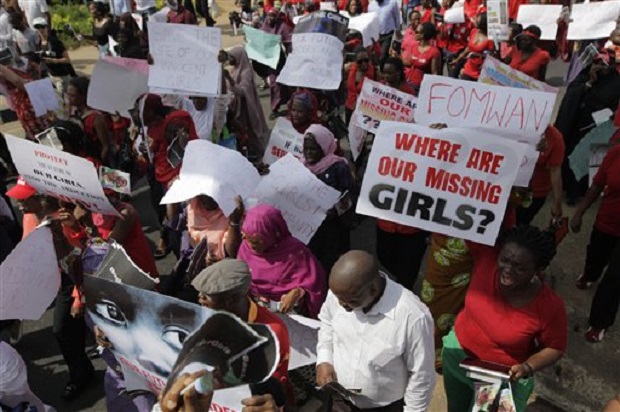
Women attend a mass-demonstration calling on the government to increase efforts to rescue the hundreds of missing kidnapped school girls of a government secondary school Chibok, in Lagos, Nigeria, Monday, May 5, 2014. Leader of a protest march Saratu Angus Ndirpaya of Chibok town, said that Nigeria’s First Lady ordered her and another protest leader to be arrested Monday, and expressed doubts there was any kidnapping and accused them of belonging to the Islamic insurgent group blamed for the abductions. Police say more than 300 girls and young women were abducted mid-April from Chibok Government Girls Secondary School, of whom some 53 girls are known to have escaped. AP
May 6
— The Vatican discloses that over the past decade it has defrocked 848 priests who raped or molested children and sanctioned another 2,572 with lesser penalties, providing the first ever breakdown of how it handled more than 3,400 cases of abuse reported to the Holy See since 2004.
May 7
— Russian President Vladimir Putin softens his tone in confrontation with the West, declaring that he has pulled his troops away from the Ukrainian border and calling for a delay in Sunday’s referendum on autonomy in Ukraine’s restive east.
May 8
— Syrian rebels level an historic hotel being used as an army base in the northern city of Aleppo by detonating bomb-packed tunnels beneath it, killing an unknown number of soldiers and demonstrating they can still deal heavy blows elsewhere in the country even as they withdraw from Homs.
May 9
— The international effort to rescue 276 schoolgirls being held captive by Islamic extremists in northeastern Nigeria gets a boost when British security experts join Nigerian and American forces trying to rescue the missing students.
May 10
— South Africa’s election commission completes vote count that determines the ruling African National Congress as the winner but also shows the strengthening of prominent opposition groups.
May 11
— Pro-Russian insurgents in eastern Ukraine say voters overwhelmingly favor sovereignty in balloting that the Ukraine central government and the West denounce as an illegal sham.
May 12
— The huge West Antarctica ice sheet is starting a glacially slow collapse, alarming scientists who say it means even more sea rise than they predicted.
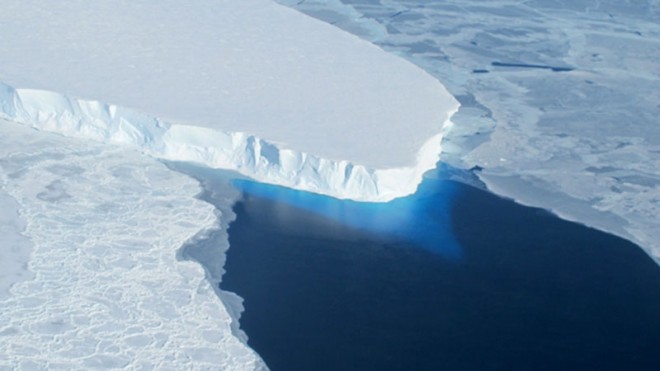
This undated handout photo provided by NASA shows the Thwaites Glacier in West Antarctic. Two new studies indicate that part of the huge West Antarctic ice sheet is starting a slow collapse in an unstoppable way. Alarmed scientists say that means even more sea level rise than they figured. AP
May 13
— Europe’s highest court gives people the means to scrub their reputations online, issuing a landmark ruling that experts say could force Google and other search engines to delete references to old debts, long ago arrests and other unflattering episodes.
May 14
— Anger and grief swell in Turkey after 274 miners die in a coal mine fire and explosion and the fate of up to 150 others remains unclear.
May 15
— Japanese Prime Minister Shinzo Abe vows to seek ways to allow the military to do more for the country’s own defense and international peace after a government-appointed panel urges reinterpretation of the country’s pacifist constitution.
May 16
— Indian opposition leader Narendra Modi will become the next prime minister of the world’s largest democracy, winning its most decisive election victory in three decades and sweeping the long-dominant Congress Party from power.
May 17
— Tens of thousands flee their homes in Bosnia and Serbia to escape the worst flooding in a century.
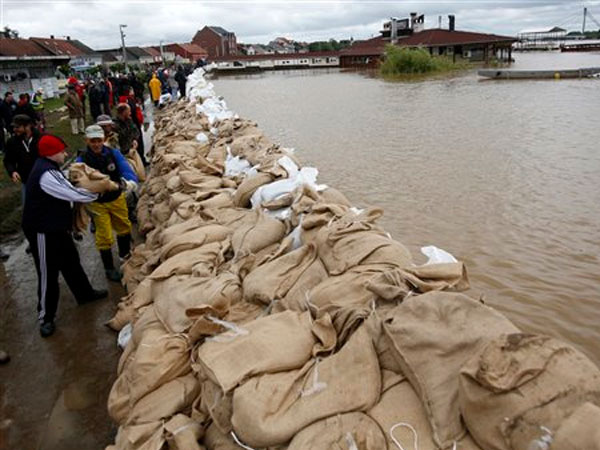
People build a dam made up of sandbags by the bank of the Sava river in Sremska Mitrovica, 90 kilometers west of Belgrade, Serbia, on May 17, 2014. The death toll from devastating floods and landslides that hit Serbia earlier this month has risen to 51, Prime Minister Aleksandar Vucic said Thursday, May 29. AP
May 18
— Forces apparently loyal to a renegade Libyan general say they suspended parliament after leading an assault against lawmakers, directly challenging the legitimacy of the weak central government three years after the overthrow of dictator Moammar Gadhafi.
May 19
— The U.S. charges five Chinese military officials with hacking into U.S. companies’ computers to steal vital trade secrets, intensifying already rising tensions.
May 20
— Two car bombs explode at a bustling bus terminal and market in Nigeria’s central city of Jos, killing at least 118 and wounding dozens in an attack that bore the hallmark of Boko Haram, the Islamic extremist group.
May 21
— China signs a $400 billion gas deal with Russia, allowing Moscow to expand the market for its major export and binding Russia more closely to Beijing as it faces international sanctions for its actions in Ukraine.
May 22
— Thailand’s military seizes power in a bloodless coup, dissolving the government, suspending the constitution and dispersing groups of protesters from both sides of the country’s political divide who had gathered in Bangkok and raised fears of a violent showdown.
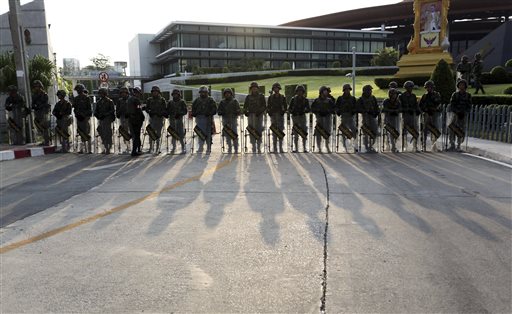
Thai soldiers stand in line blocking the entrance to the Army Club in Bangkok, Thailand Thursday, May 22, 2014. Thailand’s army chief announced a military takeover of the government Thursday, saying the coup was necessary to restore stability and order after six months of political deadlock and turmoil. AP
May 23
— Russian President Vladimir Putin pledges that Russia will respect the results of Ukraine’s presidential election, a strong indication the Kremlin wants to cool down the crisis.
May 24
—Three people are killed and one seriously injured in a shooting spree at the Jewish Museum in Brussels.
May 25
— Candy tycoon Petro Poroshenko wins Ukraine’s presidential election in the first round of balloting, sparing the bitterly divided country a run-off.
May 26
— Pope Francis wraps up his Mideast pilgrimage with a balancing act of symbolic and spontaneous gestures to press his call for peace between Jews and Muslims in the land of Jesus’ birth.
May 27
— Charting an end to the longest U.S. war, President Barack Obama says he will keep nearly 10,000 troops in Afghanistan after this year but then withdrawing virtually all by the close of 2016 and the conclusion of his presidency.
May 28
— Egypt’s former military chief Abdel-Fattah el-Sissi appears well on his way to a landslide victory in a presidential election in which voting was extended for a third day to avoid an embarrassment over a low turnout.
May 29
— In another blow to Ukraine’s armed forces, rebels shoot down a troop helicopter killing at least 12 soldiers, including a general who had served in the Soviet army and was in charge of combat training.
May 30
— Former opponents and supporters of Poland’s last communist leader, Gen. Wojciech Jaruzelski, lay him to rest with military honors while noisy protesters underscore the ambivalence about the man who imposed military rule in 1981.
May 31
— The only American soldier held prisoner in Afghanistan is freed by the Taliban in exchange for five Afghan detainees from the U.S. prison at Guantanamo Bay, Cuba.
JUNE
June 1
— Thailand’s ruling generals deploy thousands of security forces on the streets of Bangkok to thwart another round of protests denouncing last month’s military coup.
June 2
— Spain’s King Juan Carlos, who led the transition from dictatorship to democracy but faced damaging scandals amid a financial meltdown, announces he will abdicate in favor of his more popular son Felipe.
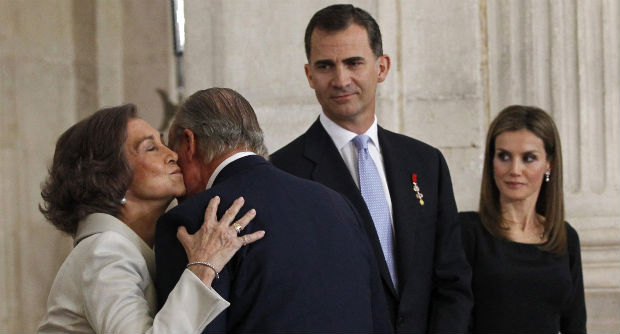
Spain’s King Juan Carlos, 2nd left is kissed by Queen Sofia, left in the presence of Spain’s Crown Prince Felipe, 3rd left and Princess Letizia after he signed an abdication law during a ceremony at the Royal Palace in Madrid, Spain, Wednesday June 18, 2014. Spain’s Juan Carlos formally ratified the law, signing a legislation setting out the legal framework for the handover so his 46-year-old son can be proclaimed King Felipe VI at a ceremony in Parliament on Thursday. AP
June 3
—Tens of thousands of Syrians in government-controlled cities vote to give President Bashar Assad a new seven-year mandate; Egypt’s former army chief, Abdel Fattah el-Sisi, is officially declared winner of a presidential election.
June 4
—Russian President Vladimir Putin is kept out of a summit meeting of world leaders but dominates the meeting as President Barack Obama and his counterparts seeks the Kremlin chief’s cooperation in ending the crisis in Ukraine.
June 5
— Royal Canadian Mounted Police comb the streets of normally tranquil Moncton, New Brunswick, in a search of a man suspected of killing three officers in the deadliest attack on their ranks in nearly a decade and later capture him.
June 6
— Historic film footage and modern interpretive dance recreate images of World War II at D-Day’s 70th anniversary, a blend of old and new that bridged seven decades and depicted a once riven Europe as a newly unified whole.
June 7
— Ukraine’s new president calls for pro-Russian rebels in the country’s east to lay down their arms and welcomes dialogue with insurgents, but says he will not negotiate with those he calls “gangsters and killers” and strikes a defiant tone on the Russian-annexed Crimea.

Ukraine’s new President Petro Poroshenko waves after the inauguration ceremony at parliament in Kiev, Ukraine, Saturday, June 7, 2014. Petro Poroshenko took the oath of office as Ukraine’s president Saturday, assuming leadership of a country mired in a violent uprising and economic troubles. AP
June 8
— Gunmen storm an airport terminal used for VIP flights and cargo in Karachi, an attack that left at least 29 people dead, including the assailants, in an attack that bore the hallmarks of the Pakistan Taliban.
June 9
— A string of sexual assaults on women during celebrations of Egypt’s presidential inauguration — including a mass attack on a student who was stripped naked in Cairo’s Tahrir Square — prompts outrage.
June 10
— Al-Qaida-inspired Islamic State militants overrun much of Mosul in a stunning assault that exposes Iraq’s eroding central authority.
June 11
— Islamic State group militants that seized a huge chunk of northern Iraq command as many as 10,000 fighters and are steadily consolidating their hold on much of northeastern Syria across the border.
June 12
— Ukraine’s new president rallies support for his plan to end fighting in the country’s east in phone calls with German and Russian leaders as he condemns what Ukrainian officials call an incursion of armored vehicles from Russia.
June 13
— Iraq’s Shiite clerical leadership calls on all Iraqis to defend their country from Sunni militants who have seized large swaths of the country; a U.N. official expresses “extreme alarm” at reprisal killings, citing reports of hundreds dead and wounded.
June 14
— Afghans brave threats of violence and searing heat to vote in a presidential runoff that likely will mark the country’s first peaceful transfer of authority, an important step toward democracy as foreign combat troops leave.
June 15
—The Islamic militants who overran cities and towns in Iraq post graphic photos that appear to show their gunmen massacring scores of captured soldiers while Iraq’s prime minister vows to “liberate every inch” of captured territory.
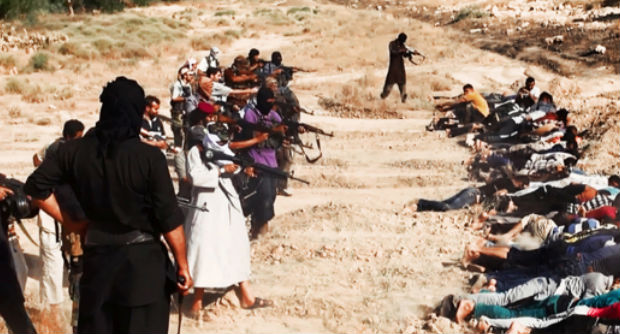
This image posted on a militant website on Saturday, June 14, 2014, which has been verified and is consistent with other AP reporting, appears to show militants from the al-Qaida-inspired Islamic State of Iraq and the Levant (ISIL) taking aim at captured Iraqi soldiers wearing plain clothes after taking over a base in Tikrit, Iraq. The United States on Sunday said it will evacuate some of its staff from its heavily protected embassy in Baghdad after Islamic militants who captured vast swathes of northern Iraq made a push for the capital. AP
June 16
—The U.S. signals a new willingness to work with Iran to help Iraq stave off an insurgency after years of trying to limit Tehran’s influence in Baghdad, a dramatic shift.
June 17
— U.S. special forces seize a “key leader” in the deadly Benghazi, Libya, attack of 2012; he faces trial in the U.S for the fiery assault that killed the U.S. ambassador and three other Americans.
June 18
— Iraqi forces and Sunni militants battle fiercely for control of the country’s largest oil refinery as Prime Minister Nouri al-Malaki goes on a diplomatic offensive, reaching out in a television address to try to regain the support of Sunnis and Kurds.
June 19
– President Barack Obama cautions the U.S. and Europe against complacency brought on by peace and pledges to reduce America’s deployed nuclear weapons by one-third if Cold War foe Russia does the same.
June 20
— The U.N. refugee agency says the 50 million people displaced worldwide at the end of last year reflect an ever-expanding web of conflicts and the largest population of displaced persons since the end of World War II.
June 21
— Sunni insurgents led by a breakaway al-Qaida group expand their offensive in a volatile western province, capturing two strategic towns and the first border crossing with Syria to fall on the Iraqi side.
June 22
— Russian President Vladimir Putin expresses support for Ukraine’s declaration of a cease-fire in its battle with pro-Russian separatists and calls on both sides to negotiate a compromise.
June 23
— An Egyptian court convicts three al-Jazeera journalists and sentences them to seven years in prison on terrorism-related charges, a verdict that brings international condemnation.
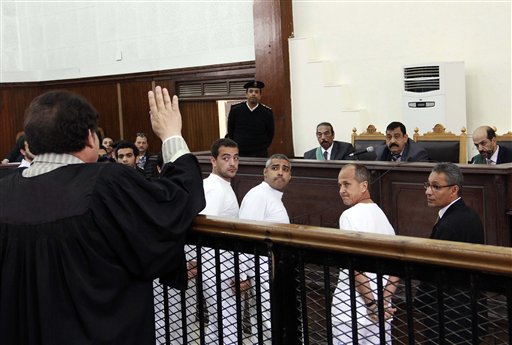
In this Monday, March 31, 2014 file photo, Al-Jazeera English producer Baher Mohamed, center left, Canadian-Egyptian acting Cairo bureau chief Mohammed Fahmy, center, and correspondent Peter Greste, second right, appear in court along with several other defendants during their trial on terror charges, in Cairo, Egypt. Judge Mohammed Nagui Shehata sentenced the three journalists to seven years in prison. They had been accused of supporting the Muslim Brotherhood, which the authorities have declared a terrorist organization. The case has caused an outcry, with rights groups saying the prosecution of the journalists was politicized and undermines freedom of expression in Egypt. AP
June 24
— Two powerful British insiders meet starkly different fates as former News of the World editor Andy Coulson is convicted of phone hacking but fellow editor Rebekah Brooks is cleared of all charges after a months-long trial centering on illegal acts at the heart of Rupert Murdoch’s newspaper empire.
June 25
— Syrian warplanes bomb Sunni militants’ positions inside Iraq, deepening concerns that the extremist insurgency that spans the two neighboring countries could morph into a wider regional conflict.
June 26
— President Barack Obama moves to ratchet up U.S. efforts to strengthen more moderate Syrian rebels proposing a $500 million plan to train and arm them as the civil war they are fighting becomes increasingly intertwined with the conflict in neighboring Iraq.
June 27
— Over Russian objections, Ukraine’s new president signs a free-trade agreement binding his country more closely to Western Europe, sealing the very agreement that triggered the bloodshed and political convulsions of the past seven months.
June 28
— The Iraq government launches its biggest push yet to wrest back ground lost to Sunni militant, as soldiers backed by tan tanks and helicopters begin an offensive to retake Takrit.
June 29
— The al-Qaida breakaway group that has seized much of northeast Syria and huge tracts in neighboring Iraq formally declares the establishment of a new Islamic state and demands allegiance from Muslims worldwide.
June 30
— The Israeli military finds the bodies of three missing teenagers just over two weeks after they were abducted in the occupied West Bank, allegedly by Hamas militants, raising fears of new fighting with them.














